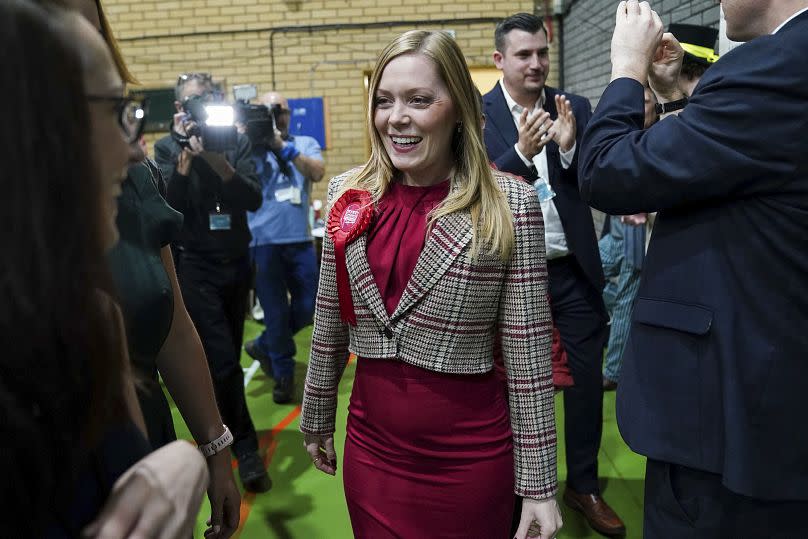'Political earthquake': UK's Labour Party win resounding victories over Conservatives
- Oops!Something went wrong.Please try again later.
- Oops!Something went wrong.Please try again later.
- Oops!Something went wrong.Please try again later.
Britain's Labour Party has decisively won by-elections, snatching seats in Parliament that were long rock-solid bastions of the Conservatives.
The governing party, which has been in power since 2010, has seen an increasing loss of support since a 2019 election won in a landslide by then-leader Boris Johnson.
Results came in the early hours of Friday morning and showed that voters in Tamworth in central England and also Mid-Bedfordshire, north of London, chose to vote for the opposition Labour party as opposed to the Conservatives in almost unprecedented numbers.
The results solidify the Labour party’s status as front-runner ahead of a national election expected some time next year.
Labour leader Keir Starmer celebrated the results, saying his party was “redrawing the political map.”
In Tamworth, the Conservatives were defending a 19,600 majority but Labour candidate Sarah Edwards took it with a 23.9 percentage point swing.
Labour's Alistair Strathern took Mid-Bedfordshire by overturning a 24,664-vote Tory margin. Replacing the former much-criticised Nadine Dorries, Strathern achieved
the largest numeric Tory majority ever overturned by Labour at a by-election since 1945.
The Conservatives had held the rural seat of Mid-Bedforshire since 1931.
Experts say the huge swings towards Labour are easy to compare to the collapse in Conservative support under Prime Minister John Major in the 1990s.
Tony Blair, the then-Labour leader, won an enormous landslide victory in 1997.
Other political commentators say the results perhaps don’t indicate so much support for Labour as could be presumed.
Turnout in Thursday's voting was low and both of the elections were fairly unusual because they were held to fill the seats of MPs who had resigned under a cloud.
Tamworth’s former Member Chris Pincher quit after Parliament’s standards watchdog recommended he be suspended for “completely inappropriate” behaviour after allegedly groping two men at a London private members’ club.

The then-Prime Minister Boris Johnson’s reluctance to sanction Pincher when the allegations emerged backfire, becoming part of the reason Johnson was ousted from the top job at the hands of his own party last year.
Mid-Bedfordshire MP Nadine Dorries resigned over this treatment of Johnson, which she perceived to be unjust, as well as her own failure to be appointed as a life peer.
Dorries remains a strong ally of Boris Johnson who has been vocal in her criticism of current Prime Minister Rishi Sunak, who she accuses of playing a role in Johsnon’s downfall.
The Conservatives immediately went into PR overdrive following the duel losses, with the party’s chairman Greg Hands blaming the losses on “legacy issues” and said people were “happy with the job Rishi Sunak is doing as prime minister”.
Even if the results aren’t as bright for Labour as they hope, they certainly put even more pressure on the governing party, which has lost several by-elections since Sunak took office just under a year ago.
He replaced Liz Truss, who announced her resignation just under a year ago after just 49 days in the job.
She’s claimed she was pushed out of office after her plan for unfunded tax cuts sent financial markets into turmoil and rocked the economy.
Truss’ seven weeks in office came after she won a party leadership contest to replace Boris Johnson, who quit after three years in office when scandals over money and ethics turned fellow Conservative MPs against him.
Sunak has been credited with slightly steadying the economy but has failed to boost the party’s rating in opinion polls.
The Conservatives consistently lag between 10 and 20 points behind Labour which is especially worrying when the law states that a national election must be called by the end of 2024 and countless top names in the party are predicted to lose their parliamentary seats.
Friday's results confirm polls showing the Conservatives are losing support across the country and across classes.
Boris Johnson managed to win over working-class northern voters in 2019 after he promised a ‘strong’ Brexit and to spread prosperity to long-neglected areas. They are now turning their backs on the Conservatives and are joined by previously-staunch Tory, affluent southern voters who have been turned off by Brexit and their perception of the government’s failures across the board.
